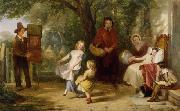China al por mayor de Marco de Oleo |
|||||||||||

|
|||||||||||
|
|
|
||||||||||||||
|
Thomas Webster
(March 10, 1800 - September 23, 1886), was an English genre painter, who lived for many years at the artists' colony in Cranbrook. Webster was born in Ranelagh Street, Pimlico, London. His father was a member of the household of George III, and the son, having shown an aptitude for music, became a chorister, first at St George's Chapel in Windsor Castle, then the Chapel Royal at St. James's Palace in London. He abandoned music for painting, however, and in 1821 was admitted as a student to the Royal Academy, exhibiting, in 1824, portraits of "Mrs Robinson and Family." In the following year he won first prize in the school of painting. In Sickness and Health (1843)In 1825, also, Webster exhibited 'Rebels shooting a Prisoner,' at the Suffolk Street Gallery - the first of a series of pictures of schoolboy life for which he subsequently became known - . In 1828 he exhibited 'The gunpowder Plot' at the Royal Academy, and in 1829 'The Prisoner' and 'A Foraging Party aroused' at the British Institution. These were followed by numerous other pictures of school and village life at both galleries. In 1840 Webster was elected an associate of the Royal Academy (ARA), and in 1846 a Royal Academician (RA) academician. He continued to be a frequent exhibitor till 1876, when he retired from the academy. He exhibited his own portrait in 1878, and 'Released from School,' his last picture, in 1879. In 1856 Webster was photographed at 'The Photographic Institute', London, by Robert Howlett, as part of a series of portraits of 'fine artists'. The picture was among a group exhibited at the Art Treasures Exhibition in Manchester in 1857. From 1835 to 1856 Webster resided at The Mall, Kensington, but the last thirty years of his life were spent at the artists' colony in Cranbrook, Kent, where he died on 23 Sept. 1886. |
||||||||||||||
|
|
||||||||||||||
|
||||||||||||||
|
|
||||||||||||||
| Thomas Webster
(March 10, 1800 - September 23, 1886), was an English genre painter, who lived for many years at the artists' colony in Cranbrook. Webster was born in Ranelagh Street, Pimlico, London. His father was a member of the household of George III, and the son, having shown an aptitude for music, became a chorister, first at St George's Chapel in Windsor Castle, then the Chapel Royal at St. James's Palace in London. He abandoned music for painting, however, and in 1821 was admitted as a student to the Royal Academy, exhibiting, in 1824, portraits of "Mrs Robinson and Family." In the following year he won first prize in the school of painting. In Sickness and Health (1843)In 1825, also, Webster exhibited 'Rebels shooting a Prisoner,' at the Suffolk Street Gallery - the first of a series of pictures of schoolboy life for which he subsequently became known - . In 1828 he exhibited 'The gunpowder Plot' at the Royal Academy, and in 1829 'The Prisoner' and 'A Foraging Party aroused' at the British Institution. These were followed by numerous other pictures of school and village life at both galleries. In 1840 Webster was elected an associate of the Royal Academy (ARA), and in 1846 a Royal Academician (RA) academician. He continued to be a frequent exhibitor till 1876, when he retired from the academy. He exhibited his own portrait in 1878, and 'Released from School,' his last picture, in 1879. In 1856 Webster was photographed at 'The Photographic Institute', London, by Robert Howlett, as part of a series of portraits of 'fine artists'. The picture was among a group exhibited at the Art Treasures Exhibition in Manchester in 1857. From 1835 to 1856 Webster resided at The Mall, Kensington, but the last thirty years of his life were spent at the artists' colony in Cranbrook, Kent, where he died on 23 Sept. 1886. Oil on canvas Date 1843(1843) cjr |
||||||||||||||
|
Related Paintings to Thomas Webster :. |
||||||||||||||
|
|
||||||||||||||
|
|
||||||||||||||
|
CONTACTE EEUU |







